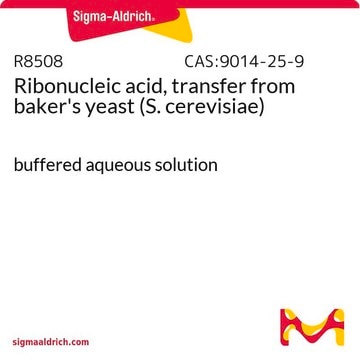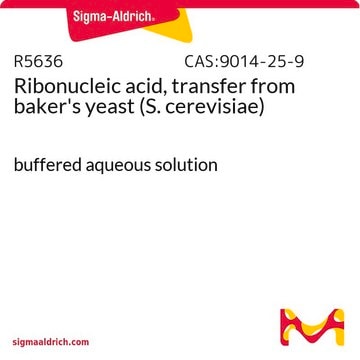R4752
Ribonucleic acid, transfer from bovine liver
Type XI, lyophilized powder
Synonyme(s) :
Transfer RNA, tRNA
Se connecterpour consulter vos tarifs contractuels et ceux de votre entreprise/organisme
About This Item
Produits recommandés
Vous recherchez des produits similaires ? Visite Guide de comparaison des produits
Catégories apparentées
Description générale
Transfer ribonucleic acid (tRNA) is a non-coding RNA. It is approximately 70-100 base pair long. It has a cloverleaf shaped secondary structure. It has three or four arms and a stem structure. It has minor bases like pseudouridine, dihydrouridine and methylated bases in its structure. It has a binding site for triplet nucleotide sequence and for amino acids.
Application
Ribonucleic acid, transfer from bovine liver has been used:
- to analyze the efficiency of thioflavin T (ThT) as a fluorophore
- to test its ability to inhibit the growth of endothelial cells
- as a component in translation mixture
- as a non-specific competitor RNA for protein purification studies using poly(A) tailed RNA affinity column
Ribonucleic acid, transfer from bovine liver may be used as a starting material for the purification of specific amino acyl-tRNA species by methods such as liquid column chromatography or high-performance liquid chromatography (HPLC).
Actions biochimiques/physiologiques
Transfer ribonucleic acid (tRNA) plays a major role in translation, a key step in protein synthesis. It decodes mRNA into protein. There are about 40-60 different tRNAs in a eukaryotic cell and fewer in bacteria. This depends on the degeneracy of the amino acid code. Each amino acid has a specific tRNA. tRNAs are charged with specific amino acid and carries them to the site of protein synthesis. It binds to the ribosome and directs the amino acid to the growing polypeptide chain. It also functions as a regulator of various biological processes. Mutations associated with tRNA is implicated in human diseases.
Définition de l'unité
One unit will yield an A260 of 1.0 in 1.0 mL of water (1 cm light path).
Remarque sur l'analyse
This product is evaluated for amino acceptor activity using aminoacyl-tRNA synthetase and L-arginine
Code de la classe de stockage
11 - Combustible Solids
Classe de danger pour l'eau (WGK)
WGK 3
Point d'éclair (°F)
Not applicable
Point d'éclair (°C)
Not applicable
Équipement de protection individuelle
Eyeshields, Gloves, type N95 (US)
Certificats d'analyse (COA)
Recherchez un Certificats d'analyse (COA) en saisissant le numéro de lot du produit. Les numéros de lot figurent sur l'étiquette du produit après les mots "Lot" ou "Batch".
Déjà en possession de ce produit ?
Retrouvez la documentation relative aux produits que vous avez récemment achetés dans la Bibliothèque de documents.
From DNA to Protein: The Transfer of Genetic Information, 217-221 (1980)
New role for tRNA and its fragment purified from human urinary bladder carcinoma conditioned medium: inhibition of endothelial cell growth
Zhao H, et al.
Journal of Cellular Biochemistry, 76(1), 109-117 (2000)
RNA-Protein Interactions : A Practical Approach, 149-150 (1998)
Approaches for monitoring nuclear translation
mRNA Processing and Metabolism, 103-113 (2004)
Molecular Biology of the Transfer RNA Revisited, 5-7 (2014)
Notre équipe de scientifiques dispose d'une expérience dans tous les secteurs de la recherche, notamment en sciences de la vie, science des matériaux, synthèse chimique, chromatographie, analyse et dans de nombreux autres domaines..
Contacter notre Service technique







